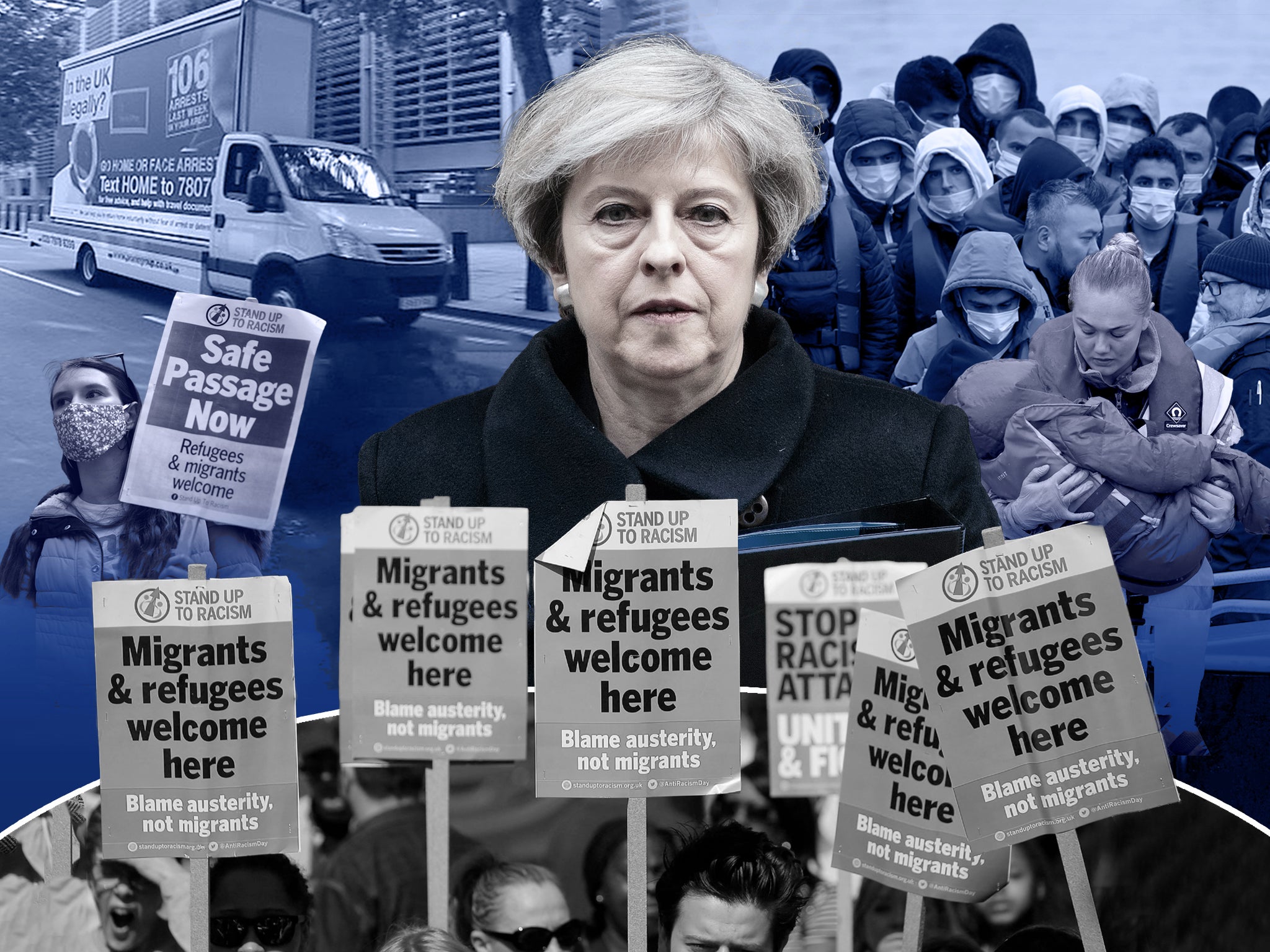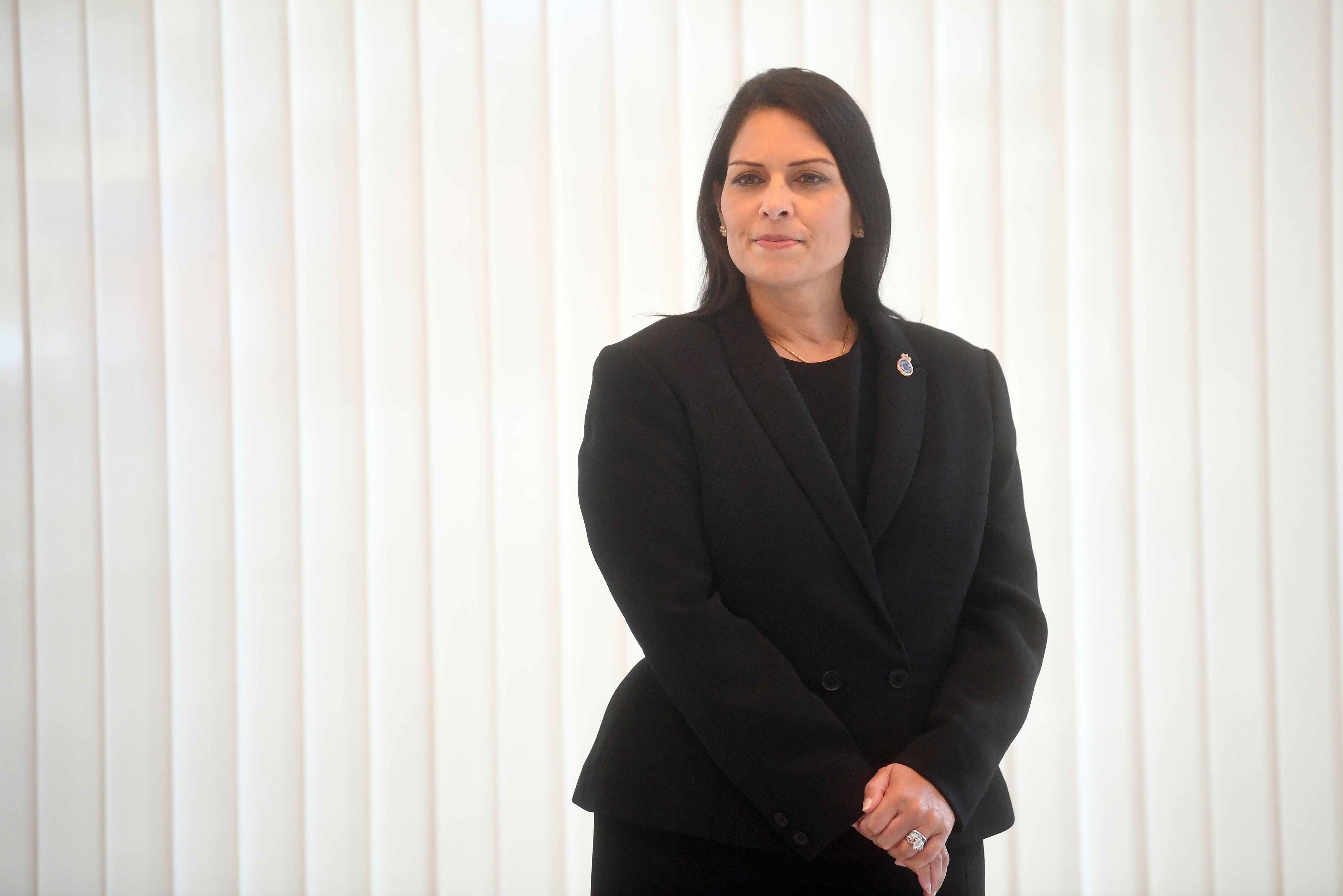‘We’re human beings too’: How a decade of the hostile environment has torn lives apart
It is 10 years since Theresa May first used the phrase that has become synonymous with hardline policies on migrants. In that decade – from ’go home’ vans to the Windrush scandal – thousands have faced fear and uncertainty as a result. They tell Nadine White their stories


Your support helps us to tell the story
From reproductive rights to climate change to Big Tech, The Independent is on the ground when the story is developing. Whether it's investigating the financials of Elon Musk's pro-Trump PAC or producing our latest documentary, 'The A Word', which shines a light on the American women fighting for reproductive rights, we know how important it is to parse out the facts from the messaging.
At such a critical moment in US history, we need reporters on the ground. Your donation allows us to keep sending journalists to speak to both sides of the story.
The Independent is trusted by Americans across the entire political spectrum. And unlike many other quality news outlets, we choose not to lock Americans out of our reporting and analysis with paywalls. We believe quality journalism should be available to everyone, paid for by those who can afford it.
Your support makes all the difference.It was on 25 May 2012 that, in an interview with the Daily Telegraph, Theresa May declared that her aim as home secretary “was to create here in Britain a really hostile environment for illegal migration”. In the decade since, under Ms May and her successors – Amber Rudd, Sajid Javid and Priti Patel – those two words, hostile environment, have been associated with a string of aggressive policies that have affected not only undocumented migrants but also those with the right to live and work in the UK.
The following year, vans emblazoned with "go home" prowled the streets, driving fear into the hearts of many.
Policies supposed to deny access to employment, housing, healthcare, bank accounts and more without correct documentation had devastating consequences for many including victims of the Windrush scandal.
The political crisis, made possible through the hostile environment policies, saw thousands of predominantly Black people stripped of their rights to live and work in Britain after wrongly being branded as illegal migrants. Numerous victims are still waiting to be compensated.
On the 10th anniversary of the term being used for the first time, The Independent has spoken with those who have been affected about what it’s like to live under this shadow of fear brought on by Britain’s hostile environment.
‘My world was shattered by this battle with the Home Office’
Junior*, 46, has been in UK for 22 years – most of that time undocumented. Originally from Ghana, Junior came to Britain to join family – helping care for his sister’s children in London – but the government would not extend his leave to remain, so he became undocumented in 2011 and thrust into uncertainty.
“Life has been terrible for a long time. I’ve been homeless for over a year now. There are other people where I’m living who have a variety of issues,” the father-of-three told The Independent.
“I’ve been struggling with depression and anxiety, with the onset of migraines which affects my ability to do anything at times.
“I’ve contemplated suicide. Sometimes I’ve felt so low to the point where I don’t care and can’t see a better alternative.”
Unemployed, Junior has been able to get by only with occasional help from his friends and family; he previously survived between odd jobs and cash-in-hand work on construction sites, which came to a halt during the Covid-19 pandemic.
Junior has children aged 16, 12 and 10, who are growing up in care in the absence of their UK-born mother. His lack of status means he has been unable to raise them himself.

“I have contact with my children and it’s not the right environment to bring young people to, even though the facility allows a few hours for visitors to come,” Junior said. “I don’t want to expose them to that atmosphere and how I’m struggling – so this means the only time we can spend together is outside.”
Over the years, he has lived with the constant fear of immigration raids; at one point, he was sleeping rough at the back of a Sainsburys supermarket.
Junior has tried to gain proper status at various points but applications fell through. He was finally granted leave to remain in November 2020, but is now classed as a "temporary" migrant, with limited leave to remain.
This means he will have to renew his visa every 2.5 years before he can get indefinite leave to remain in the UK or apply for citizenship. By this point he will be in his early fifties, and will have lived in the UK for more than half his life.
Junior has been able to derive a sense of hope, despite his adversity, through his voluntary role as a church warden and service to others, he says.
He currently sleeps within a support housing facility along with nine other people who have various complex needs and has started a health and social care diploma, while he also volunteers in a charity shop.
“I’ll be honest: faith wasn’t something that I was thinking about when I was at my lowest because, while my world was shattered by this battle with the Home Office, I sometimes thought that God should be able to solve things straight away,” he said.
“But I told myself that it’s good to help society because we’re all going through one form of hardship or another - I just hope that I can get on my feet, have custody of my children and build a better life, sooner rather than later.
“The UK government should scrap the hostile environment policies and do more to help people in situations like mine. We’re human beings too.”
‘I’ve been unable to get help’
Faith* is currently undocumented after arriving in the UK 18 years ago from Ghana. She has survived doing cash-in-hand work, which included cleaning and care work for almost two decades.
The 54-year-old currently lives with a friend in east London to whom she’s “grateful” for their generosity, but she says living with uncertainty has taken a toll on her mental health.
Before Covid-19 she had worked as a cleaner accepting cash-in-hand wages but lost this job due to the pandemic, and has struggled since to find work.
Faith says she has a lot of health problems but did not go to the GP for 10 years because doctors incorrectly told her she was not eligible to register when she first arrived.
“My health has really suffered over the years and I’ve been unable to get help from the doctors despite the fact that I’ve really needed it,” Faith said.
“It’s been hard to deal with. On any given day, I’ve been unsure of where I’m going to lay my head at night or where my next meal is coming from. It’s made me depressed – the policies, and how it’s impacted my life, has left me feeling like I’m not a human being, as if I don’t matter.”
The Joint Council for the Welfare of Immigrants (JCWI) provided her with supermarket vouchers for much of the lockdown and she also received support from her church.
“In order to get through the day, I have to believe that God will make a way for me,” Faith said.
“I have been through a lot with very little support from anyone, least of all the government.
“At times friends have helped me but it’s not possible to depend on others all of the time. I came to the UK in order to work hard and build a better life here; Ghana is extremely hard.”
At the moment, Faith is being represented on a pro-bono basis by a solicitor who has lodged an application for leave to remain with the Home Office, in the hope that she can bring almost two decades of uncertainty to an end.
‘I don’t feel as if I belong despite the fact I am British’
Glenda Caesar is one of thousands of Commonwealth nationals who were wrongly labelled as illegal immigrants through the Windrush scandal. For 10 years, she was stripped of her right to work and claim benefits in this country.
However, the 61-year-old said she felt betrayed, once again, by the Department for Work and Pensions after it suspended her universal credit payments and told her to send selfies by her front door in order to prove her eligibility and British citizenship.

Born in Dominica, Glenda, who was broguht to Britain legally as a three-month-old in 1961, received a phone call from a member of staff at the DWP last week, who asked whether she was a UK resident and told her to prove it.
One week later, the Hackney resident told The Independent that payments have still not been reinstated, despite multiple meetings, phone calls and media coverage.
“I’m fuming. I just don’t understand this bullying tactic that is going on,” she told The Independent.
“If they’re racially profiling us to find out if we have the right to be in this country then something is seriously wrong with this country.
“I don’t feel as if I belong in England despite the fact that I am British; I was raised here and have been here all my life.”
‘A hellish state of limbo’
While the government recognised mistakes of the Windrush scandal, tactics synonymous with the "hostile environment" plan continue to be put in place by the Home Office, from the Nationality and Borders Bill to proposals to deport migrants to Rwanda.
The Home Office said it was committed to an immigration system that was “fair but firm” and fully compliant with the law through an approach that was “subject to continuous review”.

But Paola Uccellari, of the JCWI, told The Independent that the rules laid down as part of the hostile environment had been "pushing people into a hellish state of legal limbo, fear and debt".
She said: "Many of our clients have lived here for years and years, even decades, but the Home Office makes these individuals – often Black and brown folk from Britain’s former colonies – feel like they don’t belong. It’s time this government moved past a dangerous and racist hostile environment that robs people of their rights – we need migration rules which allow people to live decent settled lives here, free from fear.”
Anas Mustapha, of independent advocacy group CAGE, said these policies are also intertwined with “legal and cultural islamophobia, an approach was born out of the so called ‘ war on terror’.”
Windrush Lives, a campaigning group, said the policies’ legacy goes as far back as the 1980s - and even beyond that.
“In a broader sense, the hostile environment didn’t begin in 2012,” co-founder Ramya Jaidev said. “That was merely the formal expression of a brand of policymaking. The culture of exclusion and discrimination against Black and brown people, and migrants, for political ends, is far more deep-rooted.”
Prominent equalities campaigner Patrick Vernon described the hostile environment as a “public health disaster” in light of the thousands of people who have been affected by these policies and varying degrees of trauma experienced as a result.
“Hundreds of thousands, if not millions, of people affected by these policies have experienced varieties of trauma from post-traumatic stress disorder and impact on family life to fear of losing their livelihood and the threat of deportation,” he told The Independent.
“This has had an impact on people’s minds and bodies as well.”
“The government may argue that it was necessary to have these policies to reduce net migration and to reinforce the fact that Britain is a fortress,” the campaigner continued.
“But, actually, the policies have directly impacted people who are British citizens, namely the Windrush generation, and migrant communities who are willing to work hard to contribute to Britain and yet are still stigmatised.
“This will be a stain and legacy as we look at the history and annals of 21st century Britain in the future.”
*Names have been changed to protect people’s identities
Join our commenting forum
Join thought-provoking conversations, follow other Independent readers and see their replies
Comments